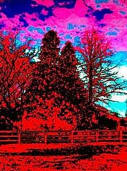
Cedar Gallery
Home
|
Cedar info |
News |
Contact |
![]() Dutch
Dutch
![]()
Metamorphosis, change...
Change of form or character, by natural grow or development, transformation.
Legends, paintings, poems, ... on the theme of metamorphosis...
Alpheius
- Apollo
- Burma -
China -
Dali -
Diana -
Escher -
India -
Kafka -
Mercury -
Narcissus -
Niobe -
Pan -
Pygmalion -
poetry -
tornado -
Zeus
niobe
Story of Niobe
Niobe mocks the women of Thebes.
Niobe was a proud daughter of the Phrygian king Tantalus and the wife of
the king of Thebes. But above all she was proud of her children, the
Niobids, seven sons and seven daughters.
One day the soothsayer Manto, by order of the gods, called upon all
women of Thebes to worship Latona, the mother of Apollo and Diana. The
women adorned their heads with laurel wreaths, burned incense and prayed
before the altar of Latona. Suddenly Niobe turned up, in a gold-laced
Phrygian dress and accompanied by friends. She addressed the women,
glorified her own origin and called upon the women to worship her, the
mother of fourteen children, instead of Latona, mother of only two.
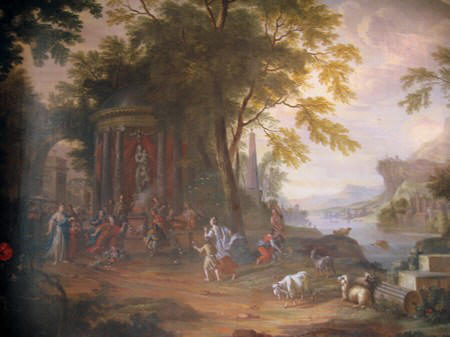
Story of Niobe
Apollo and Diana punish the Niobids
Latona was angry and turned for help to her two children. Apollo and
Diana travelled to Thebes, shrouded in a cloud.
Niobe’s seven sons were riding on a level field outside the city walls.
The first to be hit by an arrow was first-born Ismenus, then the second,
Sipylus. This moment is depicted here. On the bank of the river, far
away, Niobe and her seven daughters can be seen. Subsequently, Apollo
and Diana killed all Niobe’s and Amphion’s sons and daughters with
arrows. Amphion pierced his heart and thus ended his life and
his grief. Niobe, paralysed by despair, transformed into a piece of
marble. A strong wind lifted her up and took her to her fatherland.
There, she drips on a mountaintop and still the stone is wet with her
tears.
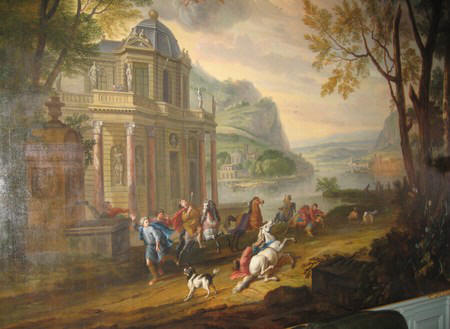
alpheius
Jan Claudius de Cock – Alpheius and Arethusa (1707)
This basrelief by the Flemish sculptor Jan Claudius de Cock (1667-1735)
depicts the rivergod Alpheus and the nymph Arethusa from one of the
stories from Ovid’s Methamorphosis. Fleeing from the amorous Alpheus,
Arethusa is changed into water by the goddess Diana. This relief is the
companion piece to the one in the right front room in the 'Kabinet der
Koningin' in The Hague. Signed and dated
1707, they predate the stone frames by 17 years. During a restoration
sketches from these frames were found on the wall behind the canvases.
Jan Claudius de Cock (1667-1735) –sculptor, painter, draughtsman and
engraver – was a student of Pieter Verbrugghen the Elder (1615-1686). In
1692 he worked in the southern city of Breda where he made decorative
sculptings for the recently completed mansion of king-steward William
III. William III of Orange (1650-1702) was Stadtholder (steward) of the
main provinces of the Dutch Republic from 1672, and from 1689 King
William III of England and Ireland and King William II of Scotland.
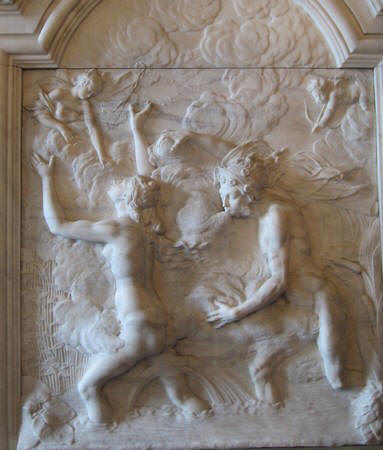
Jan Claudius de Cock
Apollo en Daphne (1707)
The bas-relief depicts Apollo and Daphne. Daphne, fleeing from Apollo who has fallen in love with her, is transformed into a laurel. The story is from the Metamorphoses of the Roman poet Ovid. The relief is a pendant of a similar relief in the room opposite (front right). Both are signed in 1707.
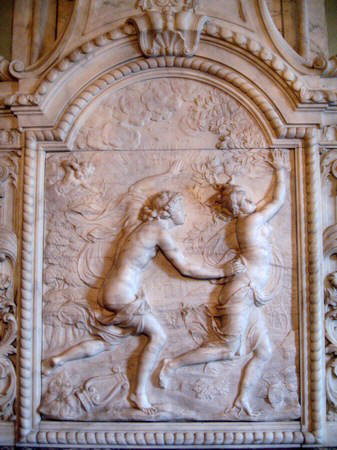
The Caledonean boar hunt (Meleager and Atalanta)
Angry at King Oeneus of Calydon, the goddess Diana sent a wild boar, which laid waste to his fields and attacked his livestock. Oeneus’ son Meleager invited heroes from the four corners of the globe to join the hunt for the boar. One of them was the beautiful huntress Atalanta, with whom Meleager fell in love. The painting shows Meleager administering the coup de grace, shortly after Atalanta had wounded the animal with an arrow. In the tragic sequel, Meleager gave the boar’s head to Atalanta. This led to a quarrel among the hunters, and in the heat of the moment Meleager stabbed two of his uncles to death. Resentful over the loss of her brothers, Meleager’s mother engineered her son’s death, after which she took her own life by falling onto a sword. The grief of Meleager’s younger sisters moved Diana to turn them into birds, rather than see them suffer.
- - - - - - - - - - TOP - - - - - - - - - -
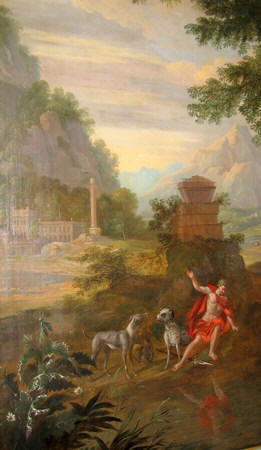

Narcissus Caravagio, Narcissus
Narcissus was a beautiful young man with whom many were in love. However, he rejected all overtures. One of those rejected raised his arms to heaven and prayed: “Let him, too, fall in love without his love being returned.” Nemesis, the goddess of vengeance and retribution, heard this and fulfilled the wish. When Narcissus, tired of the hunt, laid down at a well he became enchanted by the beauty of his own reflection. Hunger nor sleep could make him leave this place and finally he died of exhaustion. His body disappeared and at the place where he died suddenly there bloomed a white flower with a saffron-coloured heart: a narcissus (daffodil).
- - - - - - - - - - TOP - - - - - - - - - -
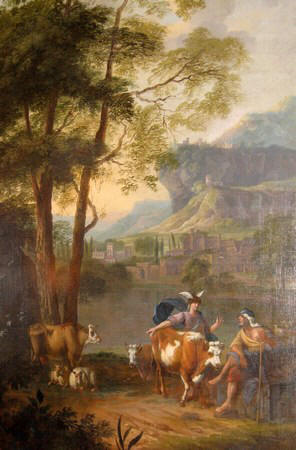
Mercury and
Battus
After Apollo killed the nymph Coronis out of jealousy, he was so
overcome with grief that he let his herd of cows wander off.
Mercury saw this and drove the herd off and into the woods. Nobody had
noticed this theft except for the old shepherd Battus. Mercury took him
aside and instructed him not to tell anybody about it. As a reward he
gave Battus a calf from the herd. The old man swore that a stone would
give away Mercury’s theft before he would.
Mercury left but returned shortly after in another guise. He asked
Battus whether he had seen his cattle and promised him a bull and a
heifer for a good tip. Battus was tempted by the reward and showed the
place where the stolen herd was.
As a punishment Mercury turned the word-breaker into a stone.
Jan Claudius de Cock
- - - - - - - - - - TOP - - - - - - - - - -
Poetry and Metamorphosis
'Metamorphosis' is a word describing a most mysterious process. Sometimes we are inclined to think that Ovid invented the concept, but when we see winter turn to the fertility of spring, the seed into the tree, the grub into a butterfly, we realize that he merely celebrated in words a paradox existing for us in the world of nature. Ovid put the word on the map of literary experience, however, and ever since, his myths and their implicit belief in a world governed by change, flux, and miraculous transformation have fascinated and haunted creative artists. This is not surprising, for their own activity is centrally metamorphic. Things become words in the writing, words become visualized objects and felt patterns of experience in the reading. Static black letters on a white page written by an absent, unknown, and often dead person may cause, in Proust's words, 'ce miracle fécond d'une communication au sein de la solitude.' By its very nature, poetry is metamorphosis, and words are its agent of change.
Charles Tomlinson,
Cambridge University Press, 1983
Metamorphosis (2004)
Lonely as a bird
in sky
Wandering in the cold night,
Opening the wings to try
To fly up towards the light,
Not even you don’t know how to
Escape the darkness inside
Like the bird which farther flew
In the nothingness of mind.
Going up while looking down
At the depth covered with copse,
The vulture floating around
Fills the air with feeble hopes
Shinning truly within you
In the solitude of space
And those eyes that gaze so cruel
Give dismay that last for days.
There is chagrin in that look,
Feels like it resembles yours
When it stops upon a brook,
Listening the water’s roars,
It sees how the world goes now
And can’t stand in nature’s circle,
Your life both are tied in bow
As the water is in whirlpool.
Could your spirit be a bird?
When mischief striking your soul
Into vulture it does turn
Having though a human core,
But as joy breaks through the dull
Dark days of lasting tears,
Vulture turns into a gull
Vanishing away the fears.
Anca Mihai
Metamorphosis
A
girlfriend came in
built me a bed
scrubbed and waxed the kitchen floor
scrubbed the walls
vacuumed
cleaned the toilet
the bathtub
scrubbed the bathroom floor
and cut my toenails and
my hair.
then
all on the same day
the plumber came and fixed the kitchen faucet
and the toilet
and the gas man fixed the heater
and the phone man fixed the phone.
now I sit in all this perfection.
it is quiet.
I have
broken off with all 3 of my girlfriends.
I felt better when everything was in
disorder.
it will take me some months to get back to normal:
I can't even find a roach to commune with.
I have lost my rythm.
I can't sleep.
I can't eat.
I have been robbed of
my filth.
Charles Bukowski
- - - - - - - - - - TOP - - - - - - - - - -
|
|
|
|
|
|
|
|
|
|
Metamorphosis I - - - - - - - - - - TOP - - - - - - - - - - |
The Metamorphosis
One morning, as Gregor Samsa was waking up from anxious dreams, he discovered that in bed he had been changed into a monstrous verminous bug. He lay on his armour-hard back and saw, as he lifted his head up a little, his brown, arched abdomen divided up into rigid bow-like sections. From this height the blanket, just about ready to slide off completely, could hardly stay in place. His numerous legs, pitifully thin in comparison to the rest of his circumference, flickered helplessly before his eyes.
“What’s happened to me,” he thought. It was no dream. His room, a proper room for a human being, only somewhat too small, lay quietly between the four well-known walls. Above the table, on which an unpacked collection of sample cloth goods was spread out—Samsa was a travelling salesman—hung the picture which he had cut out of an illustrated magazine a little while ago and set in a pretty gilt frame. It was a picture of a woman with a fur hat and a fur boa. She sat erect there, lifting up in the direction of the viewer a solid fur muff into which her entire forearm had disappeared.
Gregor’s glance then turned to the window. The dreary weather—the rain drops were falling audibly down on the metal window ledge—made him quite melancholy. “Why don’t I keep sleeping for a little while longer and forget all this foolishness,” he thought. But this was entirely impractical, for he was used to sleeping on his right side, and in his present state he could not get himself into this position. No matter how hard he threw himself onto his right side, he always rolled onto his back again. He must have tried it a hundred times, closing his eyes so that he would not have to see the wriggling legs, and gave up only when he began to feel a light, dull pain in his side which he had never felt before.
Franz Kafka
transl. Ian Johnston of Malaspina University-College, Nainamo, BC
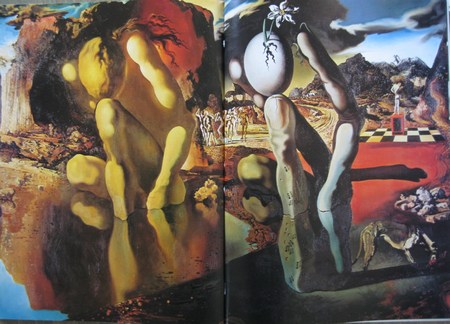
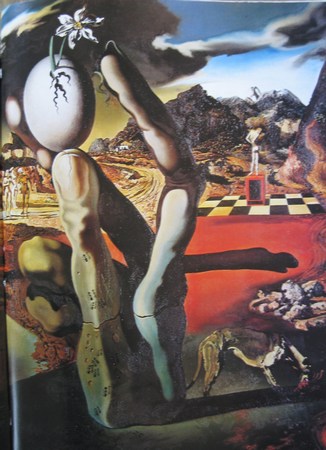
Salvador Dali, Metamorphosis of
Narcissus
- - - - - - - - - - TOP - - - - - - - - - -

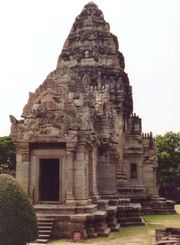
Legend of the Birman Cat (Burma)
To appreciate the legend of the Birman one must visualise the beautiful temples in ancient Burma. The magnitude of the Buddha idols helps to impress upon us the deep religious faith the people have, their belief in the reincarnation of souls and their deep respect and love for their Priests. The watchful and loving care of the 100 white temple cats is due to their belief that the Priests are returned in the form of the Sacred Cats of Burma after death.
Centuries ago the Khmer people
of Asia built beautiful temples of worship to pay homage to their
gods. The temple of Lao-Tsun housed Kyan Kse, a beautiful golden
goddess with sapphire blue eyes, who watched over the transmutation
of souls. Mun-Ha, one of the most beloved of the priests, whose
beard had been braided with gold by the great god Son-Hio, often
knelt in meditation before the golden goddess of Tsun-Kyan-Kse. Sinh,
a beautiful and faithful white temple cat, was always at his side,
and shared his meditations. As the holy priest prayed, the sacred
cat would gaze at the brilliant goddess.
One night as the moon rose and Mun-Ha was kneeling before the sacred
goddess, raiders attacked the temple and Mun-Ha was killed. At the
moment of Mun-Ha's death, Sinh placed his feet upon his fallen
master and faced the golden goddess.
Immediately the hairs of his white body were as golden as the light
radiating from the beautiful golden goddess, her beautiful blue eyes
became his very own, and his four white legs shaded downwards to a
velvety brown; but where his feet rested gently on his dead master,
the whiteness remained white, thus denoting the purity of the
Priest's soul passing into the cat.
The next morning the temple radiated with the transformation of the
hundred white cats, which, like Sinh, reflected the golden hue of
sunset. Sinh, the golden cat of Burma, never left the throne after
his master's death. Then seven days later he too died, carrying with
him into paradise the soul of Mun-Ha, his beloved master.
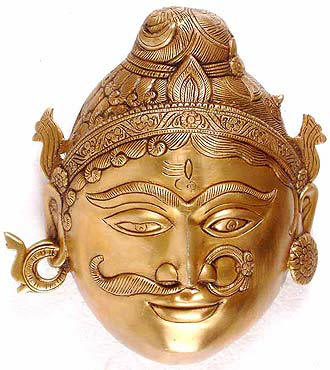
The Creation (India)
The universe has always existed,
in a mysterious way. This was in the shape of the spirit of the
universal man, Purusha, who only came to life when he became
conscious of himself.
Purusha had the shape of a man, when he declared: "I am."
But alone is still alone and Purusha longed for a partner. The
longing became so strong, that it became a woman. From their being
together the first people were born.
The woman was ashamed of her relation with Purusha, after all it was
incestuous. She decided to escape. While she was running, she
transformed into an animal. But every time when she changed, Purusha
adopted the same shape and made love to her. If the woman became a
horse, Purusha became a horse too. If the woman became a cat,
Purusha did the same. This went on and on until all species of
animals were created...
Purusha
is creation, this we know. In time, he is all that is, all that was
and all that is to be....
- - - - - - - - - - TOP - - - - - - - - - -
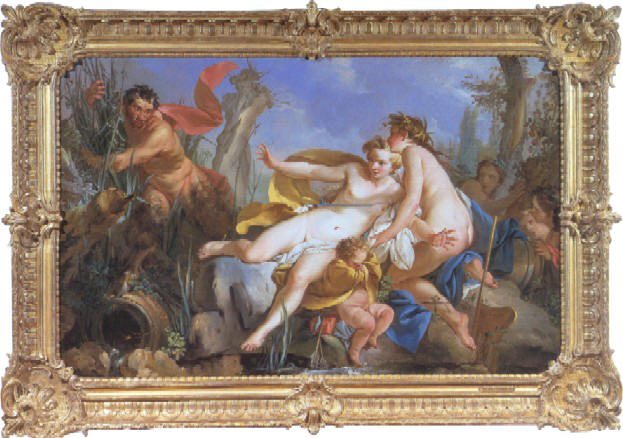
Pan and Syrinx
Pan (Greece)
Pan was a
very old god, and came from Arcadia. He is the god of the herds,
especially from goat, and is usually looking like a he-goat himself.
His appearance is a reflection of his sensual nature. He prefers to
live in woods and loves to chase girls.
Pans amorous conquests were numerous, but probably not as numerous
as he claimed.
His most famous conquest was Selene. He tempted her in the woods
with a beautiful white veil, that covered his black growth of hair
and kept his identity from Selene.
Pans love for many nymphs ususally remained unrequited.
His bond with conifers is explained by one of these failures, for
the nymph Pitys changed into a conifer, while she tried to escape
from the sensual Pan.
One of Pans other qualities - his
musicality - is bound with the nymph Syrinx, who also escaped Pan by
a metamorphosis, she changed into reed land. Pan cut the reed and
made his flute of it, the syrinx.
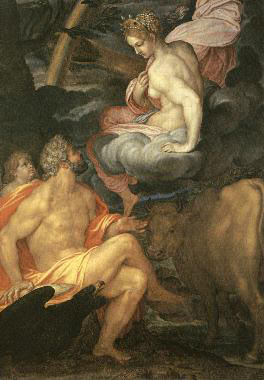
Zeus and Io (Greece)
Everyone knows what a philanderer Zeus was. Hera, his wife, didn't think it was funny. She knew her husband cheated on her just about every second of the day, but she wasn't going to just sit there and watch it. No, Hera spent just about every minute trying to curb it. You'd think that Hera would take most of her anger out on her husband. Well, she didn't. Hera spent her vengeful energy on the poor female (or in some cases male) who happened to be Zeus' current plaything.
Io, daughter of Inachus, the King of Argolis, was made a priestess to Hera. Zeus seduced the girl while she was in Hera's service. Now Hera finds out basically every time Zeus cheats on her. So did he think she wouldn't notice when it was right under her nose? Zeus was ready, because all the time he was having his way with Io, he was also keeping an eye out for Hera, and when he noticed her, he turned Io into a cow.
Zeus may have been prepared, but he underestimated his wife. Hera knew exactly what was up. First she asked him if he had slept with Io. Zeus replied that he had not "known her". Pretending she believed her husband, she asked him if he would give her the sweet white heifer as a gift. What was he supposed to say? No? So little Io was given to her patron Goddess, whose husband she'd slept with. As soon as Hera had the little cow, she set the hundred-eyed all-seeing Argus to watch it.
Knowing the Gods, there was no guarantee that Zeus would ever try to get Io out from Hera's clutches. Nevertheless Hermes was sent to rescue the fair priestess, now chained to an olive tree in Hera's backyard.
Hera lost her cow, but she wasn't done with her mortal rival. Io ran and reached Egypt. The cowness wore off. She gave birth to a son by the Nile River (his name was Epaphus) and he could have lived happily after, but Hera was completely insatiable when it came to revenge, and sent the Curetes to steal the baby. Which they did. And so Zeus had to kill them, to save the baby. Eventually, Io found her baby in Byblos and went back to Egypt, her new home. She married the king, Telegonus.
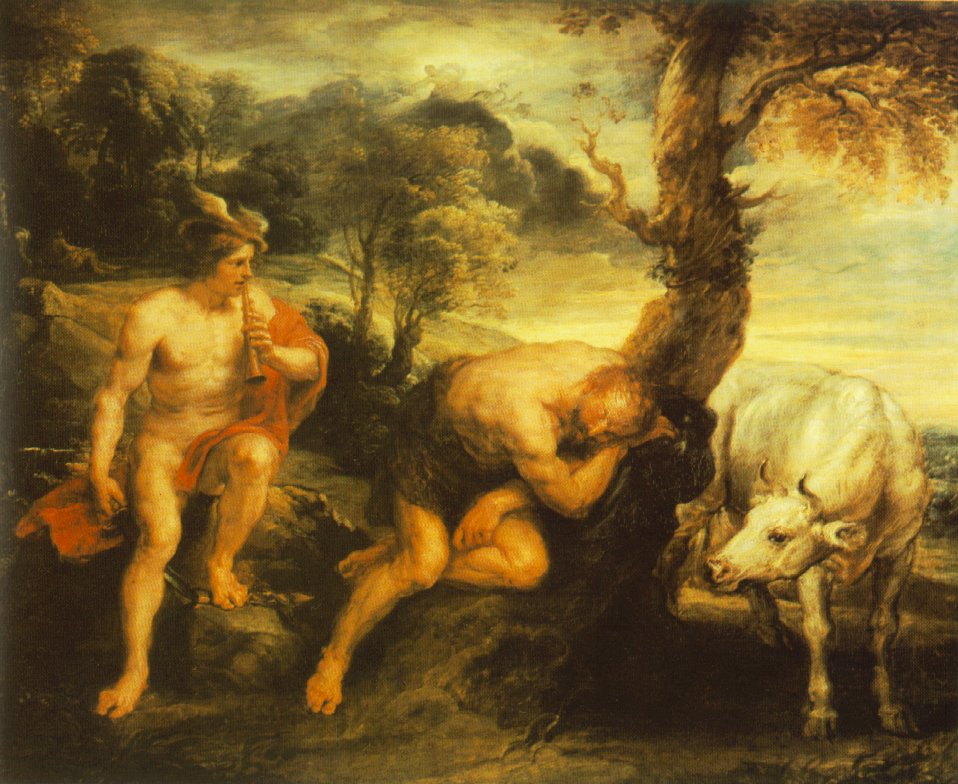
Rubens, Io
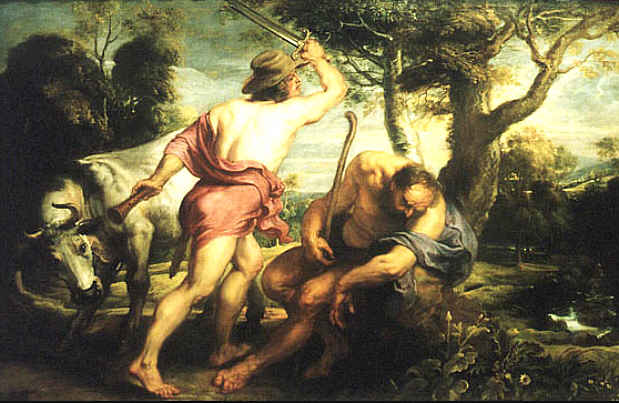
Peter Paul Rubens, Mercure kills Argus
- - - - - - - - - - TOP - - - - - - - - - -
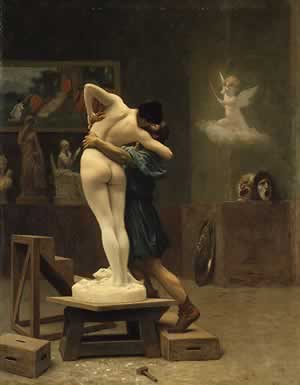
Jean-Léon Gérôme
(1824-1904),
Pygmalion
Pygmalion and Galatea (Greece)
Pygmalion was a prince from Cyprus, in Greek mythology.
Pygmalion saw so much to blame in women, that he came at last to
abhor the sex, and resolved to live unmarried. He was a sculptor,
and had made a statue of ivory, so beautiful that no living woman
came anywhere near it. Pygmalion admired his own work, and at last
fell in love with it. Often he laid his hand upon it as if to assure
himself whether it were living or not, and even then he could hardly
believe that it was only ivory. He caressed it, and gave it presents
such as young girls love, - polished stones, little birds and
flowers of various hues, and jewels. He put rings on its fingers,
and a necklace about its neck. To the ears he hung earrings and
strings of pearls upon the breast. But the statue was still made of
stone.
One day there was a festival in honor of Aphrodite. Victims were offered, the altars smoked, and the odor of incense filled the air. When Pygmalion had performed his part in the solemnities, he stood before the altar and timidly said, "Ye gods, who can do all things, give me, I pray you, for my wife" - he dared not say "my ivory virgin," but said instead - "one like my ivory virgin."
Aphrodite, who was present at the festival, heard him and knew the
thought he would have uttered; and as an omen of her favor, caused
the flame on the altar to shoot up thrice. When he returned home,
Pygmalion went to see his statue, and gave a kiss to the mouth. It
seemed to be warm. He laid his hand upon the limbs; the ivory felt
soft to his touch and yielded to his fingers like wax. While he
stood astonished and glad - though doubting, he feared he might be
mistaken - again and again with a lover’s ardor he touched the
object of his hopes. It was indeed alive!
Then at last the votary of Aphrodite found words to thank the
goddess, and pressed his lips upon lips as real as his own. The
virgin felt the kisses and blushed, and fixed her eyes on her lover.
The statue was a real woman now. After some time Pygmalion and
Galatea got a son, called Paphos.
- - - - - - - - - - TOP - - - - - - - - - -
The Story of the White Snake
(China)
This is a story
adopted from a classical Chinese novel.
Once upon a time in the
Mountain E-Mei, there were White Snake and Black Snake. White
Snake changed into a very beautiful girl, named BAI Su-Zheng
(Qing Yi). Black Snake also became a lovely maid, named Xiao
Qing (Wu Dan). They came to West Lake of Hang Zhou (Hangchow)
for a visit. They were attracted by the beauty of the scene. There
over the Duan-Qiao bridge came a young man named XU Xian (Xiao
Sheng). BAI immediately fell into an unrequited love. To help
her sister, Xiao Qing set a trick to let it rain and they took a
tree as shelter. XU Xian opened his umbrella and came near. When he
saw them, he offered his umbrella and asked them where they lived.
On a quick action, Xiao Qing told him they lived somewhere near West
Lake. A boat was then in sight. XU Xian called, paid the boatman and
asked him to ship the two ladies to their destination and himself
home. He lived with his sister's family. On the boat, they talked a
little. BAI Su-Zheng began to know XU Xian a little more. The rain
gradually stopped. When the boat made its first stop, Xiao Qing made
it rained again. So XU Xian told them to keep the umbrella and he
would take it back next day. Xiao Qing told XU that nearby there was
a red mansion, which was their home.
Next day, BAI made a red
mansion by her magic. XU went there as promised. Having him seated,
Xiao Qing made him and BAI some tea. They exchanged a few sentences.
And Xiao Qing asked XU whether he had married. When receiving a
negative reply, Xiao Qing told him that BAI was also unmarried and
suggested they two got married. When the three-attendee wedding
ceremony was on, the Abbot, named Fa Hai, of a remote Buddhist
temple, Jin Shan (Golden Mountain) Temple, sensed something and then
found what was going on. He pledged to capture the white snake.
After the marriage, the three
of them moved to Zhen Jiang, a city on the Yangtse River where BAI
provided her husband with a medicine shop. She used her magical
powers so that all medicines became especially potent, and the
business in consequence prospered exceedingly. Fa Hai found Xu Xian
there and warned that his wife was a snake. He suggested Xu a way to
find her real self, a festival alcohol drink for the September 9th
Day. September 9th was crucial for the two snakes. There would be a
moment when they had to change back to their real selves. Xiao Qing
suggested to BAI that they both went back to Mountain E-Mei for the
day. BAI did not want Xu sense any unusualness. She believed that
her magic power could prevent her from the changing and told Xiao
Qing to go alone. Xu Xian bought the festival alcohol to celebrate
the day and asked BAI to drink with him. She did not want to
disappoint her husband and thought she still could control herself, she agreed and finished a cup. But XU asked her a second cup. The
second cup made her feel awful. She rushed to the bedroom and warned
XU not to get in. Xu Xian saw her in her old form in the bed, and
simply just died of fright. When Xiao Qing came back, she waked BAI
up. Then risking her life, White Snake went to steal the glossy
ganoderma, which was heavily guarded. Moved by her brave and true
love, the owner of the drug released her and gave her the drug.
The life of Xu Xian was
restored. He suddenly remembered what the Abbot said to him.
Recovered from the illness, XU Xian went to the Temple. To separate
him from his wife, Fa Hai forced him to become a monk. BAI, along
with Xiao Qing, chased to Jin Shan Temple and begged Fa Hai to let
her husband go but got refused. Then in anger, she gathered together
a great army of underwater creatures to attack the monastery and
used water to submerge the temple. Fa Hai had a magic outer vestment,
which made the mountain grow so that the waterlevel was kept under
the temple. Fa Hai also had the magic to command heavenly soldiers.
BAI was pregnant. She could not fight the battle any longer.
BAI
and Xiao Qing fled to West Lake to where they first met Xu Xian.
Xiao Qing was very angry at Xu for his unfaithfulness and pledged to
kill him when she saw him. XU was secretly released by a young monk
when the two sides were fighting and happened to come
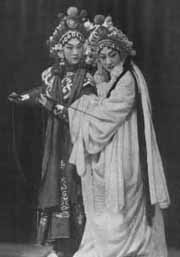 to the same
place. When they met him, Xiao Qing was for attacking him with her
sword, but BAI held her back and told XU the truth. With fully
understanding each other, they went home.
to the same
place. When they met him, Xiao Qing was for attacking him with her
sword, but BAI held her back and told XU the truth. With fully
understanding each other, they went home.
Fa Hai went to the heaven and
asked the heavenly emperor to help him. A powerful fighter with a
magic lantern was commanded to assist Fa Hai. BAI was given birth to
a son. One day, XU Xian went to buy a hat for his son. The hat was
actually the lantern, which made BAI Su-Zheng physically under the
spell of the fighter. The White Snake was then imprisoned under the
Thunder Peak Pagoda by West Lake. Black Snake fled to her original
place and practiced her magic. Several years later her magic was
strong enough to take the revenge. She managed to destroy the Pagoda
and rescued White Snake. White Snake reunited with her husband and
her son. Black Snake then defeated Fa Hai and had him swallowed by a
crab. They live together happily forever.
Interactive panoramas, klick here:
http://www.nytimes.com/interactive/2011/05/27/us/joplin-panoramas.html
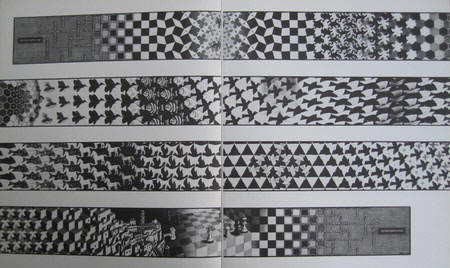

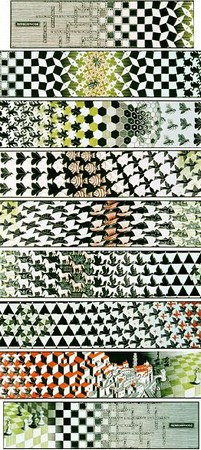 Metamorphosis III
Metamorphosis III